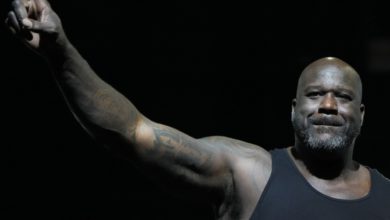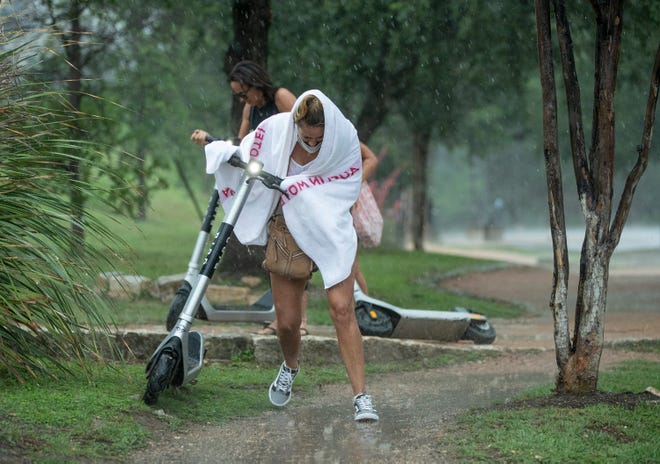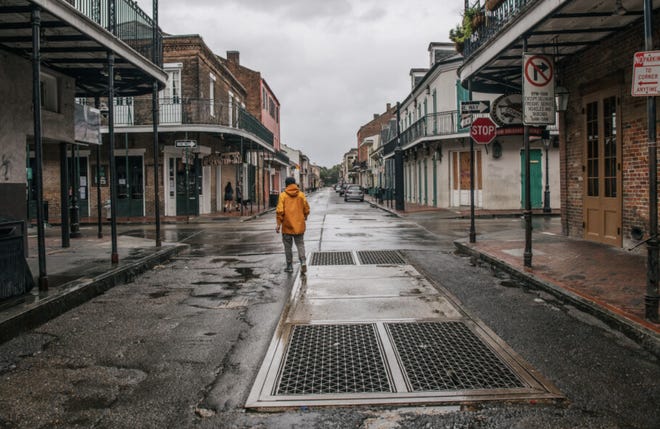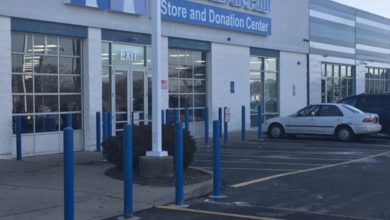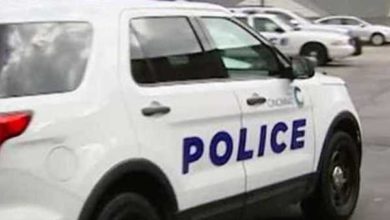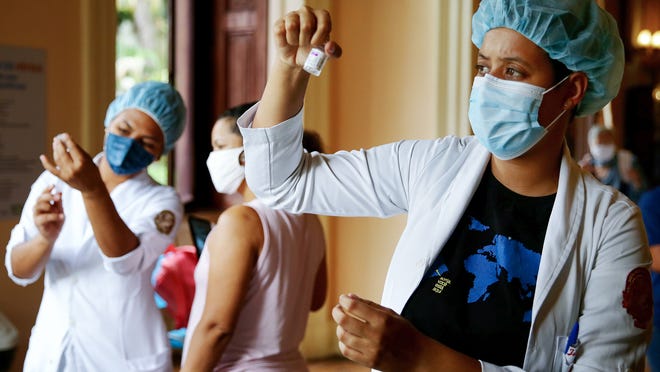
An index of “pandemic misery” released this week by USC Dornsife Center for Economic and Social Research has found that 80% of people involved in the survey experienced hardships in the past year — and that number was even higher for Black and Latino people.
The index looked at nine indicators to determine “pandemic misery”: financial insecurity, food insecurity, symptoms of moderate or severe psychological distress, symptoms of high stress, job loss since March 2020, experience of COVID-19-based discrimination, missing a housing payment, being put in isolation or quarantine, and a COVID-19 diagnosis or perceived COVID-19 infection.
The study found that Black and Latino people were more likely to know someone who died from COVID-19. More than 85% of both racial groups reported facing at least one hardship, compared to 80% of Asian people and 76% of white people.
Although hardships have decreased, there are still people who reported at least one form of economic distress in March 2021. Twenty-three percent reported experiencing financial insecurity, 7% reported experiencing food insecurity and 6% reported missing housing payments.
Also in the news:
►The filming of "Mission: Impossible 7" halted production after at least one person on the set tested positive for coronavirus, a Paramount spokesperson shared in a statement. Production will be on hiatus for 14 days.
►The United States will provide an "arsenal" of vaccines for the world and will donate 75% of its surplus doses through an international initiative for countries in need, the Biden administration announced Thursday.
►Toledo resident Jonathan Carlyle is the latest winner in Ohio’s Vac-a-Million lottery. He said that when Ohio announced the lottery, he immediately went to get vaccinated for a chance to win the $1 million. He was announced the lucky winner Wednesday.
►California Gov. Gavin Newsom announced Thursday that restaurants will continue to sell takeout alcohol and maintain outdoor seating through the rest of the year. The to-go alcoholic purchases began because the coronavirus limited indoor services and general business.
►In response to vaccine shortages in Canada, a statement by the National Advisory Committee on Immunization of Canada said people can mix their AstraZeneca vaccine with a different one for the second dose. Although they recommend both shots be the same brand, limited supplies of Moderna and AstraZeneca may result in a Pfizer follow up.
? Today's numbers: The U.S. has more than 33.3 million confirmed coronavirus cases and 596,000 deaths, according to Johns Hopkins University data. The global totals: Over 172 million cases and 3.6 million deaths. More than 136 million Americans have been fully vaccinated – 41% of the population, according to the Centers for Disease Control and Prevention.
? What we're reading: Parents desperately need child care. But day cares are struggling to retain workers. Read the full story.
Keep refreshing this page for the latest updates. Want more? Sign up for our Coronavirus Watch newsletter for updates to your inbox and join our Facebook group.
Monoclonal antibody shown to prevent COVID infection, death
The monoclonal antibody bamlanivimab, made by Lilly, can reduce the incidence of COVID-19, including deaths, among nursing home residents and staff, according to a study published Thursday.
Monoclonal antibodies, which are a concentrated version of antibodies made naturally to fight infections, have already been shown effective at preventing hospitalizations and death in people at high-risk from COVID-19. Several, including the Lilly drug, have been authorized for use against COVID-19 by the Food and Drug Administration. But this was the first large study to show that these antibodies also work prophylactically, after a person has been exposed to the virus that causes COVID-19, but before they fall ill.
In a study of 966 patients at 74 nursing homes and assisted living facilities, 15% of those who got the placebo developed COVID-19 compared to only 8.5% of those who got the antibodies. Even when they fell ill with COVID-19 people who received bamlanivimab recovered faster than those who got the placebo. Five people in the placebo group died, but none who received the active drug did. Side effects were similar in both groups.
This finding opens up the possibility of using monoclonal antibodies in people who cannot get vaccinated or who get no protection from the vaccines, because of immunity issues. Monoclonal antibodies are generally considered protective for at least three months.
“Inevitably, not all residents will be vaccinated nor will all vaccines have protective responses,” Dr. Daniel R. Kuritzkes, an infectious disease specialist at Brigham and Women’s Hospital in Boston, wrote in an editorial that ran with the study.
– Karen Weintraub
Businesses can ask if customers have been vaccinated
At bars, you might get asked to show your ID. If you visit Costco, you can't get in or buy anything without your membership card. Will more Americans soon need to keep their COVID-19 vaccination cards handy to return to normal?
The question has been percolating: Is it legal for a business to even ask for proof that you're vaccinated?
Currently, you don't have to flash your COVID-19 vaccine card in most businesses in order to shop or to get a table. However, businesses are generally free to require that customers show proof of vaccination, sometimes known as a “vaccine passport.”
Legal experts have likened the requirement to a “no shirt, no shoes, no service” policy.
"A business can absolutely ask that question," whether a customer has been vaccinated, said Lindsay Wiley, director of the Health Law and Policy Program at American University Washington College of Law, during an interview with USA TODAY.
— Brett Molina and Kelly Tyko
Contributing: The Associated Press
Source link


